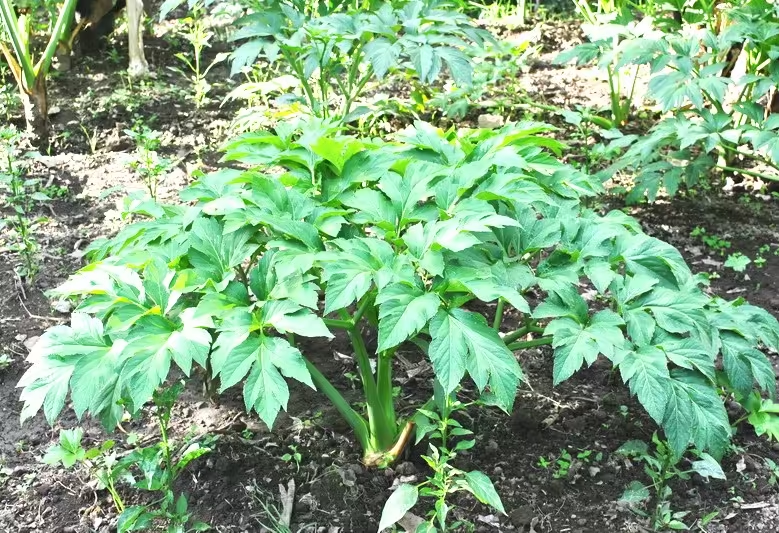Reverse Aging: Ashitaba’s Secret to Youthful Vitality
Could the secret to reversing aging be hiding in a humble Japanese plant? Meet Ashitaba (Angelica keiskei), a traditional remedy that’s making waves in the scientific community for its potential to slow aging. Known in Japan as “tomorrow’s leaf,” this perennial plant is believed to hold the key to longevity.

What is Ashitaba?
Ashitaba, scientifically known as Angelica keiskei koidzumi, is a hardy perennial plant native to the Japanese Pacific region. It grows to a height of around 120cm and boasts a slightly bitter taste. For centuries, it has been revered in Japan for its health benefits, often consumed as fresh leaves or dried powder in food and beverages.
The Secret Compound: Chalcones
Recent studies suggest that Ashitaba contains a compound known as chalcones, which could be responsible for its age-defying properties. Chalcones are natural antioxidants that help combat oxidative stress, a major factor in the aging process. By neutralizing free radicals, chalcones protect cells from damage, potentially slowing the effects of aging.
Why Chalcones Matter:
Antioxidant Powerhouse: Chalcones are packed with antioxidants, which fight off the free radicals that contribute to aging and disease.
Anti-Inflammatory Effects: These compounds may reduce inflammation, a key factor in many age-related diseases.
Cellular Rejuvenation: Chalcones promote autophagy, a process where cells remove damaged components and regenerate new ones.
Traditional Uses of Ashitaba
Ashitaba has been used in traditional Asian medicine for a variety of ailments, including:
Persistent Heartburn and Stomach Ulcers: Its soothing properties may help alleviate digestive issues.
High Blood Pressure: Ashitaba is believed to support cardiovascular health by regulating blood pressure.
Constipation: As a natural laxative, it can aid in maintaining regular bowel movements.
Despite its traditional uses, it’s important to note that there is limited scientific evidence to support these claims. However, the potential anti-aging benefits of Ashitaba are garnering significant interest in the scientific community.
The Science Behind Ashitaba’s Anti-Aging Claims
While more research is needed to confirm the anti-aging effects of Ashitaba, initial studies are promising. Scientists are particularly interested in how chalcones may influence longevity by:
Enhancing Cellular Health: By promoting autophagy and protecting cells from oxidative stress, chalcones may extend the lifespan of cells.
Reducing Age-Related Inflammation: Chronic inflammation accelerates aging, and the anti-inflammatory properties of chalcones could help counteract this process.
Supporting Heart Health: Ashitaba’s potential to lower blood pressure and improve circulation may contribute to a longer, healthier life.
How to Incorporate Ashitaba into Your Diet
Interested in trying Ashitaba for yourself?
Here are some ways to enjoy this “tomorrow’s leaf”:
Fresh Leaves: Add them to salads, smoothies, or stir-fries for a nutritional boost.
Dried Powder: Mix into teas, soups, or baked goods for an easy way to incorporate its benefits.
Tips for Buying Ashitaba:
Quality Matters: Look for organic, high-quality Ashitaba products to ensure you’re getting the most benefits.
Consult a Professional: Before adding Ashitaba to your routine, consult with a healthcare professional, especially if you have existing health conditions or are taking medication.
Could Ashitaba Be the Key to Longevity?
While Ashitaba’s anti-aging benefits are still being explored, its potential is undeniable. This traditional Japanese plant could hold the key to a longer, healthier life, offering a natural way to combat the effects of aging. As research continues, Ashitaba might just become the next big thing in the quest for longevity. Could this be the secret weapon against aging we’ve all been waiting for? Only time will tell.
Unlock the potential of Ashitaba today and take a step towards a youthful, vibrant future!
Whether you’re curious about its traditional uses or excited by its scientific promise, Ashitaba offers a fascinating glimpse into the world of natural anti-aging remedies. Don’t miss out on exploring what this incredible plant has to offer!
References:
El-Sawalhi MM, Darwish HA, Mausouf MN, et al.. Modulation of age-related changes in oxidative stress markers and energy status in the rat heart and hippocampus: a significant role for ozone therapy. Cell Biochem Funct. 2013;31(6):518–525. doi: 10.1002/cbf.2930 [PubMed] [CrossRef] [Google Scholar]
Brunk UT, Terman A.. Lipofuscin: mechanisms of age-related accumulation and influence on cell function. Free Radic Biol Med. 2002;33(5):611–619. doi: 10.1016/S0891-5849(02)00959-0 [PubMed] [CrossRef] [Google Scholar]
Quan Y, Xin Y, Tian G, et al.. Mitochondrial ROS-modulated mtDNA: A potential target for cardiac aging. Oxid Med Cell Longev. 2020;2020:9423593. doi: 10.1155/2020/9423593 [PMC free article] [PubMed] [CrossRef] [Google Scholar]
Willems A, Paepe D, Marynissen S, et al.. Results of screening of apparently healthy senior and geriatric dogs. J Vet Intern Med. 2017;31(1):81–92. doi: 10.1111/jvim.14587 [PMC free article] [PubMed] [CrossRef] [Google Scholar]
Davis HM, Essex AL, Valdez S, et al.. Short-term pharmacologic RAGE inhibition differentially affects bone and skeletal muscle in middle-aged mice. Bone. 2019;124:89–102. doi: 10.1016/j.bone.2019.04.012 [PMC free article] [PubMed] [CrossRef] [Google Scholar]

I just could not depart your web site prior to suggesting that I really loved the usual info an individual supply in your visitors Is gonna be back regularly to check up on new posts
startup talky You’re so awesome! I don’t believe I have read a single thing like that before. So great to find someone with some original thoughts on this topic. Really.. thank you for starting this up. This website is something that is needed on the internet, someone with a little originality!
I’m impressed, I need to say. Really not often do I encounter a weblog that’s both educative and entertaining, and let me let you know, you might have hit the nail on the head. Your idea is excellent; the problem is something that not sufficient people are speaking intelligently about. I’m very blissful that I stumbled throughout this in my search for something regarding this.
I do not even know how I ended up here, but I thought this post was good. I do not know who you are but definitely you are going to a famous blogger if you are not already 😉 Cheers!
Hi Neat post There is a problem along with your website in internet explorer would test this IE still is the market chief and a good section of other folks will pass over your magnificent writing due to this problem
As a Newbie, I am always searching online for articles that can help me. Thank you
helloI like your writing very so much proportion we keep up a correspondence extra approximately your post on AOL I need an expert in this space to unravel my problem May be that is you Taking a look forward to see you
I do trust all the ideas youve presented in your post They are really convincing and will definitely work Nonetheless the posts are too short for newbies May just you please lengthen them a bit from next time Thank you for the post
Keep up the fantastic work! Kalorifer Sobası odun, kömür, pelet gibi yakıtlarla çalışan ve ısıtma işlevi gören bir soba türüdür. Kalorifer Sobası içindeki yakıtın yanmasıyla oluşan ısıyı doğrudan çevresine yayar ve aynı zamanda suyun ısınmasını sağlar.
Wonderful web site Lots of useful info here Im sending it to a few friends ans additionally sharing in delicious And obviously thanks to your effort
What i do not understood is in truth how you are not actually a lot more smartlyliked than you may be now You are very intelligent You realize therefore significantly in the case of this topic produced me individually imagine it from numerous numerous angles Its like men and women dont seem to be fascinated until it is one thing to do with Woman gaga Your own stuffs nice All the time care for it up
Thank you for the good writeup It in fact was a amusement account it Look advanced to far added agreeable from you However how could we communicate
Magnificent beat I would like to apprentice while you amend your site how can i subscribe for a blog web site The account helped me a acceptable deal I had been a little bit acquainted of this your broadcast offered bright clear idea